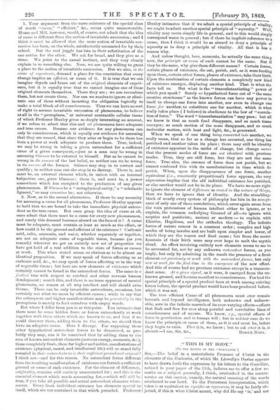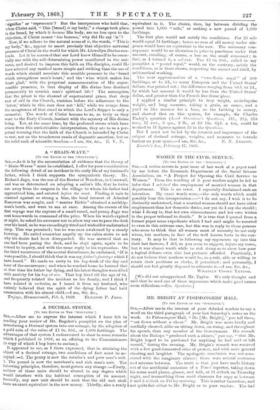." THIS IS MY BODY."
[TO THR EDITOR OP TILE " SPECTATOR:1
Stn,—The belief in a materialistic Presence of Christ in the elements of the Eucharist, of which Mr. Llewellyn Davies appears to have drawn forth the expression by his letters to the Guardia11, noticed in your paper of the 13th, induces me to offer a few remarks on a subject generally, I think, overlooked in the controversies on this matter, namely, the natural meaning of the words attributed to our Lord. To the Protestant interpretation, which takes is as equivalent to signifies or represents, it may be fairly objected, if this is what Christ meant, why did He say 'is,' and not 'signifies' or 'represents'? But the interpreters who hold that, when Christ said, "This [bread] is my body," a change took place! in the bread, by which it became His body, are no less open to the objection, if Christ meant has become,' why did He say is ' ? Now, if we adhere to the natural sense of is, the words, "This is ray body," &c., appear to assert precisely that objective universal presence of Christ in the world for which Mr. Llewellyn Davies contends. Let it be assumed that our Lord knew Himself to be essentially one with the self-determining power manifested in the universe, and desired to impress this faith on His disciples, could He have selected any method more simple and striking than the use of words which should associate this sensible presence in the bread which strengthens man's heart,' and the' wine which makes his heart glad,' with the perpetual commemoration of His supersensible presence, in that display of His divine love destined permanently to nourish man's spiritual life ? The assumption that the priest is the channel of supernatural grace, that deep root of evil in the Church, vanishes before the adherence to the letter,' which in this case does not ' kill,' while we escape from the meagreness of that creed to which the Lord's Supper is only a memorial. The words of Christ become to us, as truly as they were to the Early Church, instinct with the mystery of His divine being. Yet, at the same time, by the profound errors which have arisen from this authoritative interpretation, they are to us a perpetual warning that the faith of the Church is intended by Christ to rest, not on the treacherous sands of dogmatic assertion, but on the solid rock of scientific freedom.—I am, Sir, &c., E. V. N.



































 Previous page
Previous page